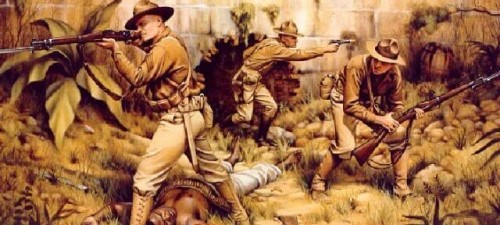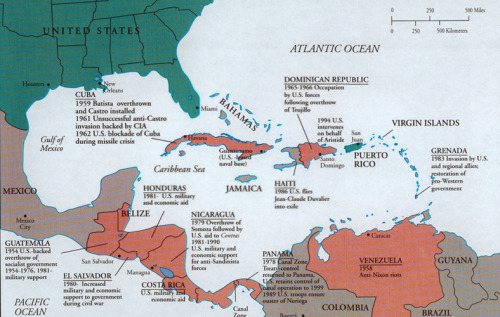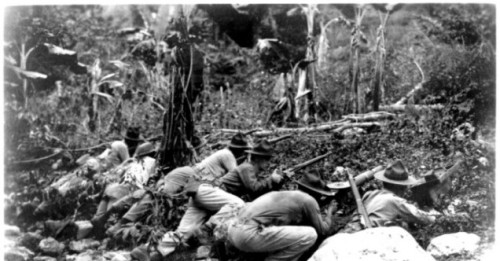A War Over Bananas — The Banana Wars of the 1920’s and 30’sBefore the Spanish Amer
A War Over Bananas — The Banana Wars of the 1920’s and 30’sBefore the Spanish American War the United States was a very isolationist nation. Generally, the government and the military did not get involved overseas unless the nation was directly involved. Then, quite suddenly American interests began to expand across the globe with the capture of Cuba, Puerto Rico, the Philippines, and the annexation of Hawaii. Suddenly then, America became an imperial colonial power, with whole armies stationed overseas and American corporations spreading out to foreign nations. It was the beginning of the time when the US would get involved in international affairs.By the turn of the century, the United States came to dominate the banana industry, which was primarily centered in Central America. The top dog of the banana business was United Fruit Company (now Chiquita Brands International), which also traded in Central American goods such as coffee, tobacco, and sugar. There were other American competitors in Central America, such as Standard Fruit Company (now Dole Foods), and Cuyamel Fruit Company. The fruit companies became so powerful, they influenced and even controlled their host nations laws, government, and elections. Many government services were run by the fruit companies, whole controlled the national railroads, postal services, radio services, electric services, and telegraph/telephone services. Essentially, the countries of Central America were controlled and run by the fruit companies (and other American companies) who made a fortune in bananas, hence they were often termed the “Banana Republics”.The fruit companies tended to install conservative politicians in office who supported policies beneficial to the companies. However these politicians tended to be highly unpopular with the people living in those countries. Around the time of World War I, the 1920’s, up to the early 1930’s a series of rebellions and revolutions broke out in Central America, typically liberal revolutions with the purpose of overthrowing conservative (and often oppressive) fruit company controlled governments or pro-America governments. For the American economy, the financial stakes were very high as a disruption of American business in Central America could lead to high losses for those businesses, high losses for stock and bond holders, high losses for banks, and high losses for subsidiary industries that worked with the fruit companies. Not to mention, in this age of imperialism, it seemed vital that the United States maintain Latin America as a strong sphere of influence, especially since a destabilized Central America could pose a threat to US control over the Panama Canal. Finally, it would not be a leap of imagination to assume that the fruit companies had many US politicians in their pockets.In 1904 President Theodore Roosevelt issued the Roosevelt Corollary, the doctrine that the US had the right to intervene in Caribbean and Central American countries in order to maintain economic stability, especially in nations who owed the US money. Such a policy was totally revolutionary. During the Spanish American War and Philippine War, the justification for foreign intervention was that it was America’s destiny to civilize “backward” nations and spread American style democracy and Christianity around the world — the so called “White Man’s Burden”. Now, the US had no grand moral idealistic pretenses, this was all about protecting America’s cash flow.Thus in the early 19th century up to 1934, a series of military interventions and occupations would occur to put down on control the various revolutions in Central America, with the goal of protecting US business interests. In 1912, US Marines invaded and occupied Nicaragua. The occupation would last until 1933, would lead to the deaths 125 US Marines, and an untold hundreds of thousands of Nicaraguans. Between 1903 and 1925 hundreds of US troops conducted operations to fight Honduran rebels who threatened the business interests of the United Fruit Company. Finally, while bananas were not involved, the Dominican Republic and Haiti were both occupied in 1915 and 1916 to protect American business interests in the region, and to end German political and military influence in the region as well.At the time the use of military and political intervention to protect American business interests was something that had rarely ever been done before. The Banana Wars would make such a policy normal routine. From overthrowing the Prime Minister of Iran in 1953 to protect oil interests to supporting tinpot dictators for cheap consumer items, it’s all good business. -- source link
Tumblr Blog : peashooter85.tumblr.com
#history#banana wars#american history#imperialism#american imperialism#wars#central america#honduras#nicaragua#theodore roosevelt#latin america#bananas#fruit#roosevelt corollary#foreign policy#business


